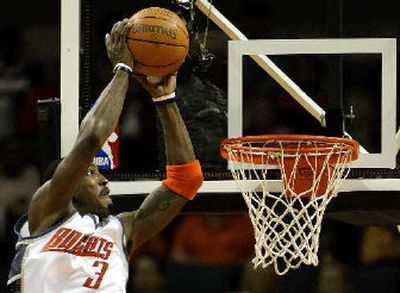Bobcats’ Wallace earns reputation as ‘G-Force’

CHARLOTTE, N.C. – Gerald Wallace routinely crashes into courtside cameras, dives into the stands after loose balls and goes to the basket so hard he’s guaranteed a handful of crash landings every game.
His all-out effort and energy led Charlotte fans to nickname him “G-Force” this season, and the Bobcats are clamoring for Wallace to get a hard look for the NBA’s Most Improved Player award.
“He’s dedicated to getting better,” coach Bernie Bickerstaff said. “I might be selfish or biased, but I think legitimately if you look at his stats, he fills up the sheet with his steals, blocked shots and rebounds.”
In his fifth year in the NBA, Wallace finally has emerged as a star.
Though he’s a natural small forward, season-ending injuries to Emeka Okafor and Sean May have forced Wallace to play most of the year inside against larger, more physical opponents.
Despite his size disadvantage – Wallace only carries a lean 220 pounds on his 6-foot-7 frame – he’s improved in every statistical category and headed into the weekend as Charlotte’s leading scorer (15.7 points) and rebounder (7.4).
But his best work is done on the defensive end.
Wallace leads the NBA with 2.27 steals a game, and ranked ninth with 2.12 blocks.
If he can keep up that pace through the final two weeks of the season, he’ll become the first player since David Robinson in 1991-92 to average better than two blocks and two steals in the same season.
Hakeem Olajuwon is the only other player in NBA history to pull off that feat, doing it three times in the late 1980s.
“I am mostly proud of my defense,” Wallace said. “Being known as a defensive player and for being aggressive is a really good thing for me because anybody can go out and score 30 points. All you have to do is shoot the ball. But can you defend a guy? Can you stop a guy from scoring 30 points?”
It took Wallace a long time to get to this point, because he was an unpolished 19-year-old when the Sacramento Kings made him the youngest player in team history in 2001.
He never really got the chance to develop in Sacramento because he languished on the bench of a veteran team.